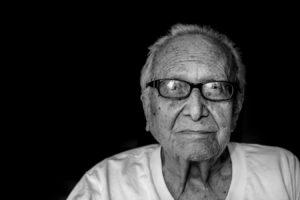The Case of Pat: Unprepared to Talk About Dying
Print this case study here: The Case of Pat
 The Case of Pat: Unprepared to Talk About Dying Bioethics
The Case of Pat: Unprepared to Talk About Dying Bioethics
Forum 13 (4), Winter 1997
Case Prepared by Rosemary Flanigan, PhD, Director of Ethics Committee Education and Training, Midwest Bioethics Center, Kansas City, Missouri.
Pat B. had never talked with her father about dying. Even when he was older and had remarried after her mother’s death, there seemed no opportunity conducive for such a talk. Her mother had died of cancer at age forty-nine after a long struggle, and Pat had assisted her father in her mother’s care and mourned with him at the continuing stream of testing and probing that her mother endured. But even that experience did not occasion any reflection on dying between them.
Her father is now ninety and two weeks ago he was brought by ambulance to County Hospital’s emergency room. He was disoriented, feverish, and suffering from bedsores. Senility had robbed him of his ability to speak for himself, and Pat’s stepmother was too emotionally fragile to make decisions for him. Pat was called and she came to the hospital to act as her father’s advocate.
There was no advance directive, no durable power of attorney for health care decisions, no discussion had taken place with his physician or his rabbi. Mr. B. had talked with no one about his dying.
After several difficult days, his bedsores began to heal and the social worker was making plans to send him home with private duty nurses to handle his care. But that evening, a nurse on routine rounds found that Mr. B. had stopped breathing. His blood pressure had plummeted so low that she could not get a reading. She called a code and the doctors performed cardiopulmonary resuscitation. They revived his heart. but he slipped into a coma. Unable to breathe on his own, he was attached to a ventilator. Instead of going home, he was transferred to the intensive care unit where Pat found him when she was called by the hospital.
The following day, Pat and her stepmother sat with a second-year resident and the director of the ICU and talked about her father’s dying. Only when she heard the two physicians say the word “dying,” did she realize that her father’s condition was fatal. When the resident asked Pat and her stepmother to tell them about Mr. B., what he was like when he was young, what was important to him, what values motivated his living, they were able to talk without inhibition. But when the conversation turned to end-of-life issues, both women became silent. The resident’s notes in the chart stated that both women “expressed their wishes that no aggressive medical treatment or intervention be taken because ‘he has already suffered so much.”‘ But the ICU director’s notes indicated that the family was still struggling with what such an approach meant, considering that Mr. B was attached to a respirator that could keep his hopeless body technically alive for months or even years. “The family does not request active disconnect,” he wrote, “but rather a peaceful completely non-interventional approach leading to peaceful death.”
But what about a DNR order? Pat’s stepmother could not answer the question, and Pat knew that the decision was hers, but she agonized over it. “I am, in general, a believer in not prolonging people’s dying,” she said, “but I have a hard time signing something saying that they shouldn’t save my father. If he had told me, if we had talked, it would be different. Maybe he would want those few extra weeks or days no matter what. It’s possible. I don’t think he would, but without ever having spoken directly about it, I’m just guessing.”
Discussion Questions
1. What obstacles in our culture have prevented Pat from talking with her father about endof-life issues?
2. Explain the obstacles to such conversations on the part of Mr. B.’s physician and his rabbi.
3. Since the goal of all treatment should be the improvement of the patient’s prognosis, comfort, well-being, or general state of health, how is Mr. B’s treatment plan impaired by lack of knowledge?
4. Even if there had been a psychological, social, spiritual care team at the hospital, it would not have helped with this case since Mr. B. lacked decisional capacity by the time he reached the hospital. How could Pat or a friend, the rabbi, or the physician have initiated conversation with Mr. B.?
5. Could the following questions be best asked by Pat, a friend, the rabbi, or the physician? By all of them?
- Is the meaning of your life changing as you have become ill (or as you find yourself aging)?
- Has this illness (or aging process) changed any attitudes you might have about the future?
- Is there anything more important to you than regaining your health?
- How does this illness (or aging process) interfere with your goals in life?
- What is the purpose of regaining your health or vigor?
- What things do you believe in or have faith in?
- Has this illness (or aging process) influenced your faith?
- How do you exercise faith in your life?
- How has your faith influenced your behavior during this time?
- What role does your faith play in having good health or in being ill?
6. Are the questions in #5 the kind of questions Pat should have addressed to her father?
7. Would the scenario have been different if some of the questions in #5 had been addressed? How?


